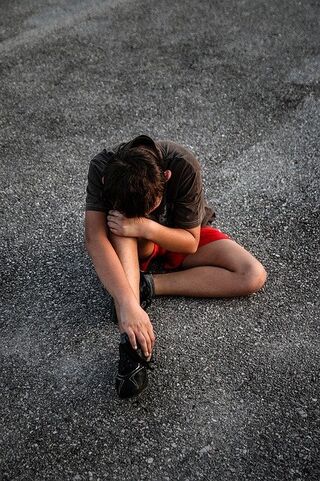Punishment
It’s Time to Disappear Corporal Punishment for Kids
There is ample evidence that physical punishment is harmful – now and long-term.
Posted May 3, 2021 Reviewed by Kaja Perina
Key points
- Empirical research demonstrates that physical punishments do kids considerably more harm than good.
- Physical punishment makes it more, rather than less, likely that children will be defiant and aggressive in the future.
- Physical punishment puts children at risk for a range of negative outcomes, including increased mental health problems.
- Adults who were hit frequently as children are more likely to suffer from depression and other negative social and mental health outcomes.

Over the last five decades, attitudes in the United States about physical discipline, also known as corporal punishment, have evolved dramatically. Physical discipline in the forms of spanking, slapping, punching, kicking, and hitting children with objects of all sorts (belts and extension cords were especially popular) was once widely accepted. To a now disturbing extent, it was often encouraged and supported, based on the misguided belief, “Spare the rod and spoil the child.” When I attended elementary school in the 1960s and early 1970s, teachers could hit students with impunity—and that was in public school!
Having had two children of my own, I know well the impulse to strike out at a child. I can’t help but understand and empathize with it. There are circumstances when the apparent unwillingness of kids to listen to their parents is absolutely exasperating. When we want our kids to do something and they don’t do it, especially when they ignore or blow off repeated requests (to clean up, turn off the TV, do their homework, brush their teeth, don’t pull on the dog’s fur or leave food on the table or mess with the remote control), the natural consequent emotional reactions are a mix of “You’ve got to be f’ing kidding me,” confusion, impatience, hurt, frustration, and anger. Yet, there is a world of difference between having the occasional understandable, natural and—I dare say—normal impulse to hit a child and acting out that impulse by actually doing it.
The only time I ever “hit” one of my daughters occurred when my eldest daughter (now 33 and a parent herself) was about two and a half years old. She picked up something from a shelf on a bookcase, and I told her to put it back. The fact that I can’t even remember what she picked up shows just how inconsequential the item was. Although she understood my request, she refused to listen and held on to whatever it was.
Developmentally speaking, she simply did what a two-and-a-half-year-old child is supposed to do: test her independence during that first phase of the separation-individuation process (the second phase being adolescence), experiencing herself as her own person distinct from me and her mother. It was early in my clinical social work career, and although I had an intellectualized sense of this, I was tired and cranky, and could feel my impatience and frustration rising. I asked her several times to put whatever it was back on the shelf, but she continued to hold on to it. Finally, I grabbed it from her tiny, delicate hand and put it back myself.
I stood in stunned disbelief as she looked right at me, walked over to the shelf, and reached out her hand to pick up the item again. I sternly told her once, and then a second time, “Don’t pick that up.” By now, my anger was coiled like a rattlesnake, ready to strike. She went ahead and picked it up, looked directly at me, and started to smile. Chances were that she thought we were playing some sort of game, but I automatically interpreted her actions as willful unmitigated defiance that demanded a strong response. Impulsively, I smacked her hand—hard.
My guilt-laden regret was instantaneous. I watched in horror as the change in her demeanor seemed to start at her feet and work its way up her little body in slow motion until her smile dissolved into a frown, and her lips began to quiver. As she started to cry, she looked at me as if to say, “How could you do that to me? You’re supposed to protect me.” I felt as though I had betrayed her—because I had. I don’t know if it was traumatic for her, but it was for me. Shortly thereafter, she didn’t remember the experience. I, on the other hand, will never forget it.
Although there are (and may always be) holdouts that insist on reserving the so-called right to spank or otherwise physically discipline their kids, since approximately the 1980s, these activities have generally and appropriately been viewed as child abuse. Ample research demonstrates that physical punishments do kids considerably more harm than good.
The Report on Physical Punishment in the United States: What Research Tells Us about Its Effects on Children by Elizabeth T. Gershoff, PhD, addresses the association between parental physical punishment and eleven child behaviors and experiences. A meta-analytic and theoretical review of over one hundred years of social science research and hundreds of published studies on physical punishment, conducted by professionals in the fields of psychology, medicine, education, social work, and sociology, found that
- There is little evidence that physical punishment improves children’s behavior in the long term, and increasing empirical data indicates the physical punishment of children is an ineffective parenting practice.
- Physical punishment makes it more, rather than less, likely that children will be defiant and aggressive in the future.
- Physical punishment puts children at risk for a range of negative outcomes, including increased mental health problems.
- Children who are physically punished are at greater risk of serious injury and physical abuse.
- When administered regularly, physical punishment increases antisocial behaviors such as lying, stealing, cheating, bullying, assaulting a sibling or peers, and lack of remorse for wrongdoing.
- Physical punishment serves as a model for aggressive behavior and inappropriate ways of dealing with conflict.
- Physical punishment erodes trust between a parent and child.
- Adults who were hit frequently as children are more likely to suffer from depression and other negative social and mental health outcomes.
Copyright 2021 Dan Mager, MSW
References
E.T. Gershoff, Report on Physical Punishment in the United States: What Research Tells Us About Its Effects on Children. Columbus, OH: Center for Effective Discipline (2008).




